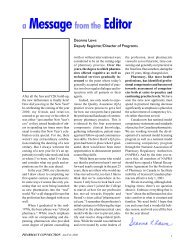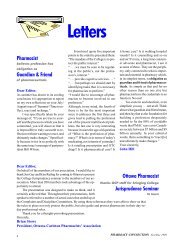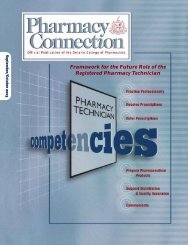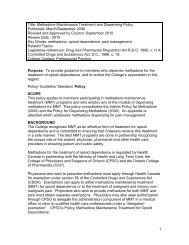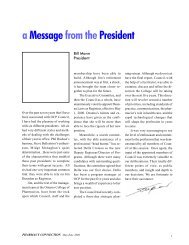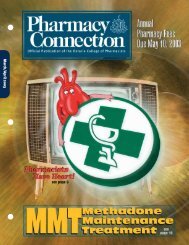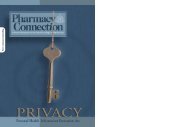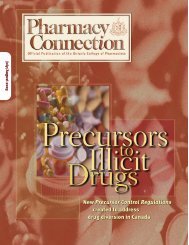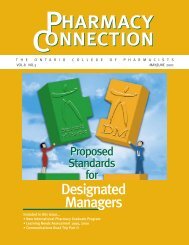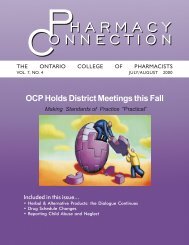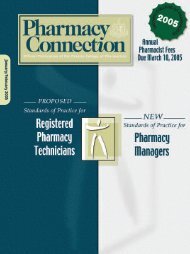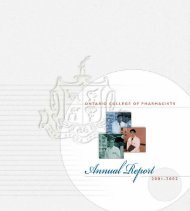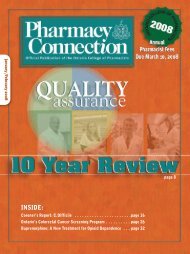Download - Ontario College of Pharmacists
Download - Ontario College of Pharmacists
Download - Ontario College of Pharmacists
You also want an ePaper? Increase the reach of your titles
YUMPU automatically turns print PDFs into web optimized ePapers that Google loves.
MEDICATION HISTORIES<br />
sources, the pharmacy technician<br />
can create a pre-reconciled list for<br />
the pharmacist prior to the patient/<br />
family interview. With considerable<br />
knowledge <strong>of</strong> medications and<br />
their usual dosing, the pharmacy<br />
technician may even use that<br />
opportunity to highlight any<br />
potential issues for the pharmacist<br />
to clarify during the interview 6 .<br />
The more therapeutic BPMH task<br />
that should still be conducted by<br />
pharmacists would be the patient/<br />
family interview since some<br />
drug-related therapeutic problems<br />
can be identified, clarified, and even<br />
resolved within that interaction;<br />
and the pharmacist’s subsequent<br />
recommendations can be more<br />
detailed following an extensive<br />
examination <strong>of</strong> the patient and his/<br />
her medication use. The technical<br />
components <strong>of</strong> the BPMH<br />
consumes about one-third <strong>of</strong> the<br />
time a pharmacist uses in conducting<br />
BPMHs, thus delegating these<br />
tasks to a pharmacy technician<br />
would improve workflow and allow<br />
the pharmacy team to evaluate<br />
every patient at the hospital’s<br />
first point <strong>of</strong> contact – <strong>of</strong>ten the<br />
Emergency department – in order<br />
to identify and resolve drug-related<br />
therapeutic issues as soon as<br />
possible.<br />
With the ever-changing healthcare<br />
climate in <strong>Ontario</strong>, it is important<br />
for hospitals to be able to deliver<br />
cost-effective patient care without<br />
sacrificing quality <strong>of</strong> care. In the<br />
method outlined above, the BPMH<br />
process can be carried out by<br />
qualified healthcare pr<strong>of</strong>essionals in<br />
practical collaboration, with accurate<br />
and efficient results, and optimization<br />
<strong>of</strong> patient care. To definitively<br />
decide how best to perform<br />
BPMHs, however, a larger study<br />
over a longer period <strong>of</strong> time must<br />
be done comparing pharmacists<br />
alone, pharmacy technicians alone,<br />
and a collaborative team <strong>of</strong> both (as<br />
proposed above).<br />
ACKNOWLEDGEMENTS<br />
I would like to thank my preceptor,<br />
Nicole Crichton, for encouraging<br />
me to analyze the literature on this<br />
topic and recommend solutions<br />
based on my research and personal<br />
experience in the hospital’s Emergency<br />
Department. I would also like<br />
to express my gratitude to Pr<strong>of</strong>essor<br />
Marie Rocchi for her support<br />
during every stage <strong>of</strong> writing this<br />
paper.<br />
REFERENCES<br />
1. American <strong>Pharmacists</strong> Association (2012)<br />
Principles <strong>of</strong> Practice for Pharmaceutical Care.<br />
www.pharmacist.com. [July 14, 2012]<br />
2. Dersch-Mills, D., Hugel, K., and Nystrom, M.<br />
(2011) Completeness <strong>of</strong> Information Sources<br />
Used to Prepare Best Possible Medication<br />
Histories for Pediatric Patients. Canadian Journal<br />
<strong>of</strong> Hospital Pharmacy. 64(1): 10-15. [July 12,<br />
2012]<br />
3. Institute for Safe Medication Practices Canada<br />
(2012) Medication Reconciliation Can Help to<br />
Reduce the Chance <strong>of</strong> Errors with Medicines!<br />
SafeMedicationUse.ca Newsletter. 3(1). [July 10,<br />
2012]<br />
4. Johnston, R., Saulnier, L., and Gould, O.<br />
(2010) Best Possible Medication History in the<br />
Emergency Department: Comparing Pharmacy<br />
Technicians and <strong>Pharmacists</strong>. Canadian Journal<br />
<strong>of</strong> Hospital Pharmacy. 63(5): 359-365. [July 10,<br />
2012]<br />
5. Leung, M., Jung, J., Lau, W., Kiaii, M., and Jung,<br />
B. (2009) Best Possible Medication History for<br />
Hemodialysis Patients Obtained by a Pharmacy<br />
Technician. Canadian Journal <strong>of</strong> Hospital<br />
Pharmacy. 62(5):386-391. [July 12, 2012]<br />
6. National Association <strong>of</strong> Pharmacy Regulatory<br />
Authorities (2011) Model <strong>of</strong> Standards <strong>of</strong><br />
Practice for Canadian Pharmacy Technicians.<br />
OCP Standards, Policies, and Guidelines. pp6-14.<br />
[July 14, 2012]<br />
7. National Association <strong>of</strong> Pharmacy Regulatory<br />
Authorities (2009) Model <strong>of</strong> Standards <strong>of</strong><br />
Practice for Canadian <strong>Pharmacists</strong>. OCP<br />
Standards, Policies, and Guidelines. pp8-18. [July<br />
14, 2012]<br />
8. National Association <strong>of</strong> Pharmacy Regulatory<br />
Authorities (2007) A Vision for Pharmacy<br />
Practice. Pr<strong>of</strong>essional Competencies for<br />
Canadian Pharmacy Technicians at Entry to<br />
Practice. pp5-7. [July 10, 2012]<br />
9. Pharmacy Services (2012) Medication<br />
Reconciliation. North York General Hospital<br />
Guideline. pp1-2. [July 10, 2012]<br />
10. Safer Healthcare Now! (2011) Getting<br />
Started Kit. Medication Reconciliation in Acute<br />
Care. pp7-11. [July 14, 2012]<br />
11. U, David (2004) The Canadian Adverse<br />
Events Study and Medication Safety. Hospital<br />
News. http://www.hospitalnews.com/<br />
the-canadian-adverse-events-study-andmedication-safety/.<br />
[July 12, 2012]<br />
PHARMACY CONNECTION ~ WINTER 2013 ~ PAGE 29



